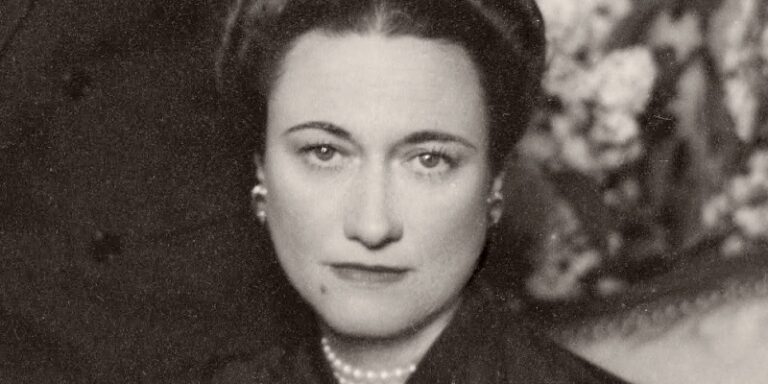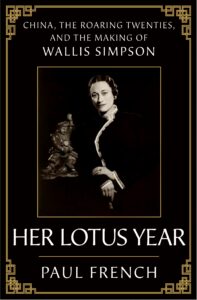The Mystery of Wallis Simpson’s Visit to Shanghai and Her Search for the Elusive “Hurry-Up” Divorce

What would have impressed Wallis Simpson on her arrival in Shanghai, as it did most visitors, was its modernity. In 1924, the International Settlement (largely run by the British) and the adjacent French Concession were significantly more developed than Canton, while few would disagree that the laissez-faire society of treaty port Shanghai was more fun than the stuffy and snobbish colonial milieu of Hong Kong.
It was a city of vast department stores, neon lights, its traffic jammed with imported American automobiles, and a cacophony of noise blaring from new radio stations, gramophones, and dance halls. The streets were thronged with foreigners and smartly dressed westernized Chinese alongside the city’s merchants, rickshaw pullers, and beggars. Aldous Huxley visited at around the same time as Wallis and remarked, “In no city, West or East, have I ever had such an impression of dense, rank richly clotted life.”
A walled town of traders and fishermen, Shanghai had been forcibly opened as a treaty port, or foreign concession, after the First Opium War in the mid-nineteenth century. Its economy and population boomed. By the second decade of the twentieth century, Shanghai had become notorious for its freebooting attitude to capitalism and embrace of the modern in all its forms.
From her initial arrival at the Bund Terminal, looking out of her window at the Palace, exploring just a few blocks around her hotel, Wallis would have encountered the bustling life of the city, teeming with itinerant vendors, Western businessmen, fashionably clad Chinese women, European and Chinese policemen patrolling together, off-duty soldiers and sailors of a dozen nations looking for fun, country bumpkins come to town with big dreams and high hopes. Shanghai’s pivotal role as an entrepôt—sending out the products of China’s vast hinterlands to the world, receiving imports from every continent—was obvious just looking at the constant stream of barges, junks, and steamers on the Whangpoo. She could see the cotton mills and silk filatures that stretched for miles along the banks of the Whangpoo in Hongkew almost back as far as the Yangtze through the northern semi-industrial areas of Tilanchao (Tilanqiao) and Shanghai’s most easterly district, Yangtszepoo (Yangpu).
And along with goods came new technologies and foreign cultures. Western ideas took hold fast in Shanghai. Almost simultaneously, the Shanghai Securities & Commodities Exchange started operations in 1921, and a group of like-minded Chinese met clandestinely in a French Concession school to establish the Chinese Communist Party. Wallis could not possibly have missed the polyglot and multicultural nature of the city—Europeans and Americans, Russian émigrés from Bolshevism and Baghdadi Jewish merchants, Sikh coppers in the settlement and Annamese flics in Frenchtown. North of Soochow Creek, a “Little Tokyo” district had emerged as large numbers of Japanese (the largest non-Chinese community in Shanghai) arrived. The European and American foreigners termed themselves “Shanghailanders” and were not shy to show their assumed superiority. The Chinese who settled became Shanghainese, developing their own distinctive dialect, cuisine, and aesthetic—hai-pai—a brazen and vibrant East-meets-West culture.
Not everybody took to Shanghai, finding it vulgar and brash. The British writer Harold Acton, resident for many years in Peking, recorded his first visits to Shanghai in his book Memoirs of an Aesthete. Acton, a dedicated Pekingophile, didn’t think much of Shanghailander society:
Thirty years—sometimes more—without troubling to learn the language, and these “Old China Hands” pickled in alcohol considered themselves supreme authorities on the country and the people . . . They were inveterate grumblers. A traveler fresh from Europe who, instead of sozzling, went about sober with his eyes open, was plain “green”; his views worthless.
And in among all this cacophony of diverse Shanghai humanity were Americans. The journalist Edgar Snow, fleeing the onset of the Depression in America for what he hoped would be an opportunity to prove himself a talented writer in China, wrote extensively of his fellow countrymen and -women:
Shanghai, to a noticeable extent, has become Americanized. There, in the most polyglot city in Asia, the roving American finds all the comforts of home: Clara Bow and Buddy Rogers, the radio and jazz bands, cocktails and correspondence schools, night clubs and cabarets, neon lights and skyscrapers, chewing gum and Buicks, wide trousers and long skirts, Methodist evangelists and the Salvation Army. And there, too, he finds such peculiarly American institutions as Navy Wives, shot-gun weddings, Girl Scouts, Spanish-American War veterans, a board of censors, daylight hold-ups, immaculate barbershops, a Short Story Club, wheat cakes, and a Chamber of Commerce… The fact is that nobody in Shanghai worries himself very much about SinoAmerican understanding. Both the Chinese and Americans are too busy making money.”
Mary and Wallis thus joined approximately thirty thousand other foreigners in a city of three million Chinese—one of the five largest conurbations in the world and the most densely populated of any major global metropolis. In the International Settlement in 1924, two thousand American citizens were registered as residents, with about another thousand or so in the adjacent French Concession. That compared to nearly six thousand Brits, three thousand Russian émigrés, and fourteen thousand Japanese.
*
Wallis arrived in Shanghai determined to divorce Win. Win appears to have been apologetic for his behavior. He actually came to see her off on the liner from Hong Kong. She wrote in The Heart Has Its Reasons: “As he said good-bye at the gangway, his parting words were: ‘Pensacola, Coronado, Washington, and now Hong Kong—we’ve come a long way, only to lose what we began with.’” Win had also agreed to provide her with a monthly sum of money, what was called an allotment, of (a not ungenerous) $225.
Despite the abuse and violence in their marriage, in later life, Wallis would reminisce quite fondly of Win. But she had planned her escape and the possible divorce route of the US court in Shanghai. She sailed out of Hong Kong Harbour for Shanghai. She would only ever see Win once more in his lifetime.
Despite her family’s continuing distaste for separations, Wallis knew that she had to get a divorce. She had originally tried in Paris, but it had proved too difficult and too costly, while her family talked her out of it. A divorce in British Hong Kong was impossible; certainly nothing could be done in Chinese Canton. But rumor had it that she might be able to succeed in Shanghai.
As a treaty port, Shanghai had special exemptions. Shanghailanders were not subject to Chinese law and justice, answering only to their own national courts—the so-called system of extraterritoriality. The Europeans had run their own courts to settle business disputes and contested estates, and to control their errant citizens since the late nineteenth century. But America had only just got its legal act together in Shanghai.
In 1906, President Teddy Roosevelt, alarmed at the number of American citizens who’d moved to Shanghai to become casino operators and brothel madams, legislated for the creation of the United States Court for China at Shanghai. It was not before time either. Shanghai, at the turn of the century (and then an influx after the 1906 San Francisco earthquake), had been infested with so many American prostitutes that the term American girl had become popular slang across Asia for white women of dubious virtue.
Roosevelt was outraged on behalf of the nation. While the Shanghai International Settlement authorities might not always wish to prosecute an American for running a bordello, an opium den, or a casino, extraterritoriality could go both ways. If it was illegal in America, then they could be prosecuted for it in China. Extrality would become a tool of conviction rather than a way to slip through the grip of the law. And so he acted. The court was presided over by American judges and had the power to send the guilty to the hangman or alternatively to the harsh Bilibid Prison in the Philippines or back home to McNeil Island Corrections Center in Puget Sound. Additionally, the court could deal with all manner of everyday estates, wills, contractual issues, and (so Wallis had been led to believe in Hong Kong) divorce cases.
However, it transpired that the American court could not in fact divorce the Spencers. It could grant divorces for adultery, desertion, cruelty, or nonsupport, but it required two years’ residence in China (not counting British Hong Kong). Wallis’s plans of making a permanent legal break with Win in Shanghai were dashed.
The Shanghai-based American lawyer Norwood Allman had seen others turn up in the hope of obtaining “quicky” separations. He advised that anyone requiring a “hurry-up” divorce would do better to head home to Nevada, Oklahoma, or Arkansas to make arrangements. This strange, extraterritorial legal situation in Shanghai has confused many Wallis biographers over the years, leading to some falsehoods. For instance, Joe Bryan and Charles J.V. Murphy’s 1979 biography, The Windsor Story, claimed that Wallis couldn’t afford the cost of the divorce charged by the “International Court.”
_____________________________
